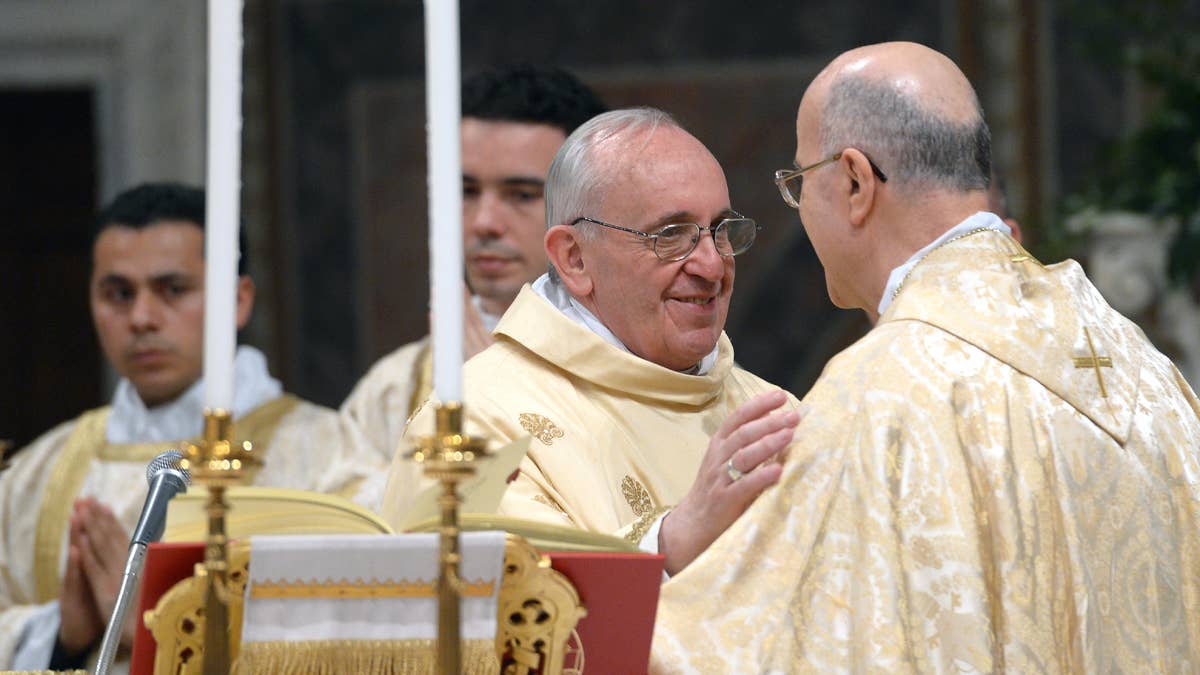
In this photo provided by the Vatican newspaper L'Osservatore Romano, Pope Francis greets Secretary of State cardinal Tarcisio Bertone, right, as he celebrates his inaugural Mass with cardinals, inside the Sistine Chapel, at the Vatican, Thursday, March 14, 2013. (AP Photo/L'Osservatore Romano, ho) (AP2013)
Argentine Cardinal Jorge Mario Bergoglio, now Pope Francis I, is being hailed as the first non-European Pontiff since Syrian Gregory III in the 8th century, as well as the first Latin American and the first Jesuit in heading the Catholic Church. These facts are indisputable yet by taking them at face value, we may not see that they show as much as they hide.
A man known for his austere lifestyle, who used public transportation and shunned the mansion he was entitled to as Archbishop of Buenos Aires and instead opted for a tiny apartment where he did his own cooking, the election has been seen as a sign of his convictions. Most commentators and the public have been inclined to see in the name he chose for his pontificate after St. Francis of Assisi, the 13th century Italian saint who turned his back to his family wealth and led a life of poverty, founding an order based on the values of asceticism.
In an anecdote that illustrates the man, Bergoglio telephoned the country’s Security Minister as the biggest financial crisis was unfolding in the country in late 2001 to protest brutal police repression against demonstrators unable to withdraw their bank savings.
It may very well be the case that Francis I chose to be named after the Assisi saint. That would be a statement in itself about new times for a Church that has been criticized, somewhat simplistically, for opulence. Still, few have noticed that the Pope may have decided to honor Francis Xavier, first missionary of the Jesuit order. Francis I may share the spirit and practice of Franciscans, but he is a Jesuit. And this is of no small significance.
Much as Franciscans are known for their vows of poverty, Jesuits are known for their military discipline as well as, oddly, their uneasy coexistence with political power. They are known as “soldiers of Christ” –in reference to order founder St. Ignatius of Loyola military background, whose loyalty to the Pope was absolute. Not for nothing the papal proclamation creating the order in the 16th century was called Regimini Militantis Ecclesiae, or To the Government of the Church Militant. Still, despite their apparent establishment bent, they were famously expelled from the Spanish Empire and the Portuguese dominions in the 18th century as the Iberian monarchies watched with unease the Society of Jesus’ (the order’s official name) growing influence in politics and business, with a reputation for cunning and intrigues.
In the turbulent 1970’s in Latin America, Jesuits –who are also noted for their promotion of education– earned understated recognition for their discreet yet resolute determination to preserve independence from the powers that be and their violent detractors, in the years of lead and fire that pitted military regimes and leftist militants against each other. At the time, Bergoglio had contacts with Argentina’s juntas that ruled the country, the vices of necessity that come with positions of power, which is why he is disliked and opposed by many in the Argentine left.
He is also known, however, for his stinging criticism of President Cristina Kirchner’s government and her husband’s, Néstor, that preceded hers. In an anecdote that illustrates the man, Bergoglio telephoned the country’s Security Minister as the biggest financial crisis was unfolding in the country in late 2001 to protest brutal police repression against demonstrators unable to withdraw their bank savings.
Much has been made of his opposition to same-sex marriage and women in the priesthood, without taking into full account that the Church still thinks in centuries. It took the Church around 400 years to issue an apology to Galileo Galilei, which Pope John Paul II did in 2000, after the Italian astronomer had been denounced as a heretic for his heliocentric theory and saying the Earth turns around the Sun. It can hardly be realistic to expect the new pope to embrace new societal tendencies and demands that were outrageous even in lay society in the West barely two decades ago.
And finally yes, the new Pope is Argentine, which shows the Catholic Church’s tilt towards Latin America and generally the South, including Africa, where its power in numbers is. Like most Argentines, Francis I loves soccer –he is a San Lorenzo fan– and of Italian descent. Jorge Luis Borges, the South American nation’s preeminent writer –of whose work the new Pope is an avid reader– is said to have quipped: “Argentines are Italians who speak Spanish, who think they are French and would love to be English.”
The cardinals, after a 35-year intermission –a mere blink in Church history– of Pope John Paul II and German Benedict XVI, restored if not an Italian, the son of an Italian couple, to the throne. The change from two Central Europeans to the traditional Italian pontiff may be smaller than it seems. It would be more akin to switching from Holy Roman Emperors back to the true Roman ones. What the Borges quip implies is that Argentines are not really Latin Americans, not in outlook and not in ambitions.
Italians are the direct descendants of Romans and the last non-European pope reigned seven centuries before the last fragment of the Roman Empire, Constantinople, fell in 1453. Actually, the last surviving institution from the Roman Empire is the Holy See, which now reigns over a very tiny part of a territory that covered much of the known world but rules the hearts and minds of the largest number of followers it has ever had. Render to Caesar the things that are Caesar’s, and to God the things that are God’s.
